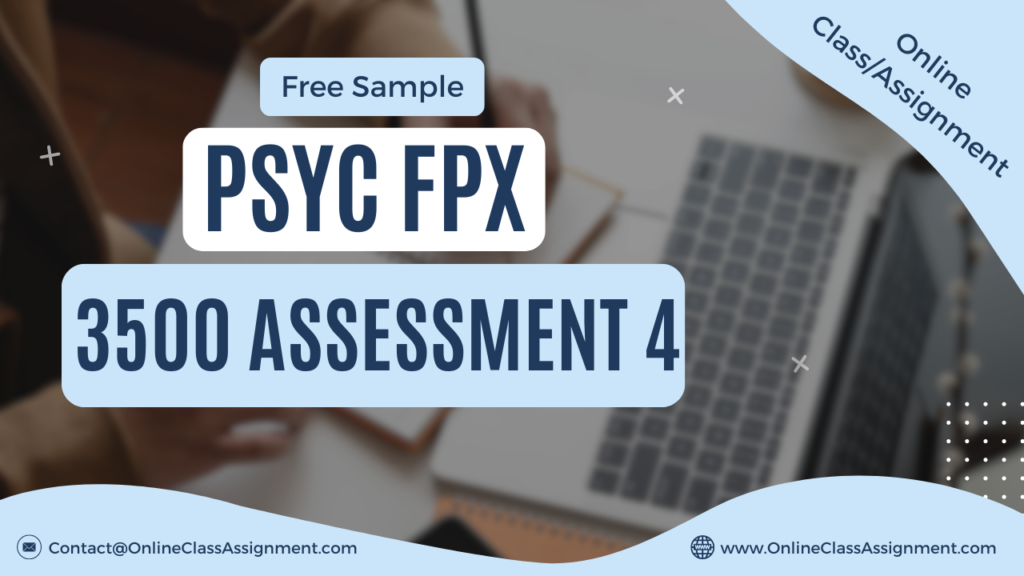
PSYC FPX 3500 Assessment 4 Strategies for Enhancing Learning and Memory Fact Sheet
Student Name
Capella University
PSYC FPX 3500 Learning and Cognition
Prof. Name
Date
Abstract
The brain plays a crucial role in learning and memory, involving processes like encoding, consolidation, and retrieval. This paper explores various techniques to enhance memory, especially in the elderly population. Techniques such as writing, visual imagery, mnemonics, and the multi-store memory model are discussed. Additionally, lifestyle factors like healthy living, socialization, and memory exercises are examined for their impact on memory in older adults. Theoretical frameworks such as activity theory and continuity theory of aging provide insights into memory improvement strategies.
Keywords: Memory, cognitive learning, Brain, memory techniques, elderly population
Front Page
Title: Learning And Memory Fact Sheet
The brain processes information through encoding, consolidating, and retrieving data. Encoding involves modifying sensory input for storage, facilitated by the hippocampus. Consolidation utilizes stored information for processing new data, while retrieval recalls stored information. Effective functioning of these processes enhances daily activities.
Example: Participants recalling words exemplifies retrieval. These functions support effective brain functioning and memory storage.
Techniques For Enhancing Learning And Memory
Rephrasing or Writing Down Information
Writing information aids memory by enhancing encoding and retrieval processes, improving long-term retention.
Multi-Store Model of Memory
Atkinson-Shiffrin’s model outlines memory storage stages: sensory input, short-term memory, and long-term memory, emphasizing rehearsal for retrieval.
Creating Mnemonics
Mnemonics, like rhymes or acronyms, aid memory retention by facilitating associations.
Visual Imagery
Visual techniques, such as videos or pictures, aid long-term memory storage by enhancing retention.
Back Page
Title: Enhancing Learning And Memory For Elderly Population
Exercise the Memory
Memory exercises, including card games and puzzles, improve cognitive function and memory in older adults.
Healthy Lifestyle
A healthy lifestyle, incorporating balanced nutrition and exercise, improves brain function and memory retention in the elderly.
Socialization
Social engagement enhances cognitive function and memory in older adults, reducing isolation and depression.
Theories And Research Findings For Improved Memory In Elders
Activity Theory To Improve Elder Memory
Active engagement in learning activities improves memory and cognitive function in the elderly, reducing stress and isolation.
Continuity Theory of Aging
Engagement in learning activities and socialization improves memory and cognitive function in older adults, aligning with past experiences.
Research Findings:
Studies suggest that factors like diet, exercise, and socialization improve memory in older adults.
Conclusion
Effective memory enhancement techniques, coupled with a healthy lifestyle and social engagement, improve memory function in older adults, contributing to overall well-being.
Self-Evaluation
| Criterion | Level | Rationale |
|---|---|---|
| Describe brain functions | Proficient | Clear explanation with evidence |
| Techniques explanation | Distinguished | Detailed explanations with scholarly support |
| Application of theories | Distinguished | Effective application of theories with relevant discussion |
| Self-evaluation | Distinguished | Detailed evaluation addressing each criterion |
| Writing style | Proficient | Clear and engaging language |
| APA style | Distinguished | Adherence to APA 7th edition guidelines |
References
Babaei, P., & Azari, H. B. (2022). Exercise training improves memory performance in older adults: A narrative review of evidence and possible mechanisms. Frontiers in Human Neuroscience.
Drigas, A., Mitsea, E., & Skianis, C. (2022). Metamemory: Metacognitive strategies for improved memory operations and the role of VR and mobiles. Behavioral Sciences, 12(11), 450.
PSYC FPX 3500 Assessment 4 Strategies for Enhancing Learning and Memory Fact Sheet
Guedes, J., & Melo, S. (2019). Continuity theory. Encyclopedia of Gerontology and Population Aging.
Mcdermott, K., & Roediger, H. (2018). Memory (encoding, storage, retrieval).
Schmidt, M., & Tawfik, A. A. (2022). Activity theory as a lens for developing and applying personas and scenarios in learning experience design. The Journal of Applied Instructional Design, 11(1).
Tsai, F.-J., & Shen, S.-W. (2022). Concepts of dementia prevention in the health promotion among older adults: A narrative review. Medicine, 101(50), 32172.
Weerasinghe, M., Biener, V., Grubert, J., Quigley, A., Toniolo, A., Pucihar, K. C., & Kljun, M. (2022). Vocabulary: Learning vocabulary in AR supported by keyword visualizations. IEEE Transactions on Visualization and Computer Graphics.
Zhidong, C., Wang, X., Yin, J., Song, D., & Chen, Z. (2021). Effects of physical exercise on working memory in older adults: A systematic and meta-analytic review. European Review of Aging and Physical Activity, 18(1).
PSYC FPX 3500 Assessment 4 Strategies for Enhancing Learning and Memory Fact Sheet
Get Capella University Free BS Psychology Samples
BIO FPX 1000
COM FPX 1150
HIM FPX 4610
HIS FPX 1150
HUM FPX 1150
PSYC FPX 1000
PSYC FPX 2200
PSYC FPX 2300
